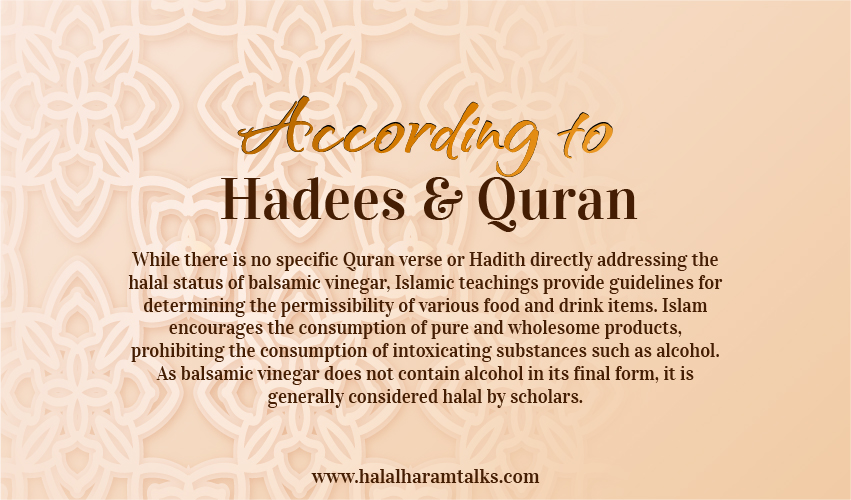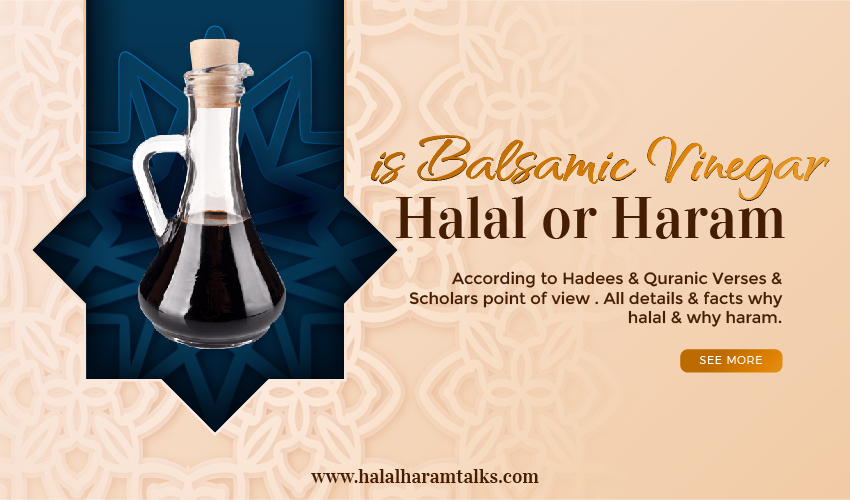Balsamic vinegar is a popular condiment known for its distinctive flavor and versatility in various culinary dishes. However, for individuals adhering to the Islamic faith, it is essential to determine whether balsamic vinegar is halal or not. In this article, we will explore the question “Is balsamic vinegar halal?” and provide a comprehensive understanding of the topic.
Is Balsamic Vinegar Halal or Haram?
When it comes to determining the halal status of balsamic vinegar, it is important to analyze the ingredients used in its production. Balsamic vinegar is traditionally made from grape must, which is freshly squeezed juice obtained from grapes. This must undergo a rigorous aging process, typically in wooden barrels, to achieve the desired taste and texture. Unlike wine vinegar, balsamic vinegar does not undergo fermentation and does not contain alcohol in its final form.
According to the majority of scholars, balsamic vinegar is considered halal due to its production process and the absence of alcohol. However, it is crucial to keep in mind that some specific brands or variations of balsamic vinegar may contain additives or other ingredients that could render it haram. Therefore, it is advisable to refer to the ingredient list or seek reliable halal certification for assurance.
For more: Is Bacon Halal
Ingredients Used In Balsamic Vinegar
The primary ingredient used in the production of balsamic vinegar is a grape must, which is essentially the juice extracted from grapes. This must is subjected to a long aging process that occurs in different types of wooden barrels, such as oak, cherry, mulberry, or juniper, resulting in the rich and distinct flavor of balsamic vinegar. During the aging process, the natural sugars in the grape must are gradually converted into a syrupy consistency.
Other than grape must, balsamic vinegar may include varying proportions of wine vinegar or additional additives like caramel for color enhancement or sulfites for preservation. It is crucial to carefully examine the ingredient list provided by each brand to ensure compliance with halal standards.
For more: Is Bovine Gelatin Halal
Quran Verse or Hadith Referring to Balsamic Vinegar
While there is no specific Quran verse or Hadith directly addressing the halal status of balsamic vinegar, Islamic teachings provide guidelines for determining the permissibility of various food and drink items. Islam encourages the consumption of pure and wholesome products, prohibiting the consumption of intoxicating substances such as alcohol. As balsamic vinegar does not contain alcohol in its final form, it is generally considered halal by scholars.
It is important to note that some scholars may have differing opinions based on their interpretation of Islamic teachings and may consider the use of any vinegar questionable unless explicitly halal-certified. Therefore, individuals should consult local scholars or Islamic organizations for precise guidance on this matter.

Is Wine Vinegar Halal?
Wine vinegar, unlike balsamic vinegar, is derived from the fermentation of wine. As alcohol is used in the fermentation process, wine vinegar contains trace amounts of alcohol, which makes it haram according to Islamic dietary laws. Thus, it is essential to differentiate between balsamic vinegar and wine vinegar, ensuring the proper selection of halal options.
For more: Is Rice Wine Vinegar Halal
Is Balsamic Vinegar Halal in Different Countries?
The halal status of balsamic vinegar may vary in different countries due to differences in production methods, labeling regulations, and the variety of available brands. Let’s take a look at the halal status of balsamic vinegar in the United Kingdom (UK), the United States (US), and Australia:
- Is Balsamic Vinegar Halal in the UK? In the UK, many brands of balsamic vinegar hold suitable halal certification, ensuring their compliance with Islamic dietary laws. It is crucial to look for recognized halal certifications or consult the Halal Food Authority (HFA) for reliable information.
- Is Balsamic Vinegar Halal in the US? Similarly, in the United States, several halal-certified brands of it are readily available. Organizations like the Islamic Food and Nutrition Council of America (IFANCA) provide a list of halal-certified products, including balsamic vinegar.
- Is Balsamic Vinegar Halal in Australia? In Australia, the halal certification process is overseen by organizations such as the Australian Federation of Islamic Councils (AFIC). Numerous brands of balsamic vinegar in Australia bear halal certification, ensuring their adherence to Islamic dietary requirements.
It is important to conduct thorough research or consult local halal authorities to ensure that the specific brand of balsamic vinegar being consumed meets the halal standards set by the respective country.
For more: Is Vinegar Halal
Is Balsamic Vinegar Halal According to Primary Schools of Thought
In general, vinegar is considered permissible (halal) by these schools of thought if it is produced from a permissible source, such as dates, grapes, or barley. Balsamic vinegar is made from grapes, so it fulfills the condition of having a permissible source. However, certain factors should be taken into consideration to determine its permissibility:
- Alcohol content: Some balsamic vinegar go through an aging process that involves fermentation. Which may produce a small percentage of alcohol. According to the majority view in Islamic jurisprudence, a small amount of alcohol (less than 0.5% by volume) is considered permissible and does not render the product impure. Therefore, if the alcohol content in it is within this limit, it would be considered halal.
- Production method: It is important to ensure that the balsamic vinegar does not contain any impermissible additives or ingredients. Care should be taken to avoid any haram (forbidden) substances or processing methods.
However, it is essential to consult with a knowledgeable scholar or a religious authority. Who can provide specific advice based on the school of thought and any additional rulings within your particular community or country? They can provide guidance based on the specific ingredients and production methods used in the balsamic vinegar you come across.
For more: Is Spirit Vinegar Halal
The Role of Certification in Determining if Balsamic Vinegar is Halal
Halal certification plays a crucial role in determining the halal status of it. And ensuring compliance with Islamic dietary guidelines. Halal certification boards or organizations are responsible for scrutinizing the ingredients. production processes. And handling practices of various food products, including balsamic vinegar. They conduct thorough inspections, maintain strict quality control, and issue halal certification to products that meet their standards.
When it comes to balsamic vinegar. It is advisable to look for products that carry recognized halal certification from trusted authorities. These certifications provide assurance to individuals concerned about the halal status of their food. And indicate that strict guidelines have been followed throughout the production and supply chain.
For more: Is Gluten Halal [An Authentic Guide]
FAQs
A: Yes, pregnant and nursing women can consume balsamic vinegar. As balsamic vinegar does not contain alcohol in its final form. It is considered safe for consumption during pregnancy and breastfeeding. However, it is always advisable to consult with a healthcare professional for individual dietary recommendations.
A: Yes, there are halal alternatives to it available in the market. Some brands produce halal-certified vinegar specifically marketed as an alternative to traditional balsamic kinds of vinegar. These alternatives offer a similar flavor and can be used in various recipes that call for balsamic vinegar.
A: Yes, balsamic vinegar can be used in cooking during Ramadan. As long as it is free from alcohol or wine vinegar. Balsamic vinegar is considered permissible and can be used to enhance the flavor of various dishes without compromising the individual’s fast.
Conclusion
Balsamic vinegar is generally considered halal by Islamic scholars due to its production process and absence of alcohol. However, it is essential to be mindful of specific brands that may contain additives or other haram ingredients. It is recommended to check the ingredient list and look for reputable halal certifications. To assure compliance with Islamic dietary guidelines.
To stay informed about what is halal and haram, it is recommended to frequently visit our website. Where you can find comprehensive information, articles, and resources regarding various food products, including balsamic vinegar. Understanding the halal status of different food items assists individuals in making informed choices aligned with their Islamic beliefs and dietary requirements.
